 Petzlover
Petzlover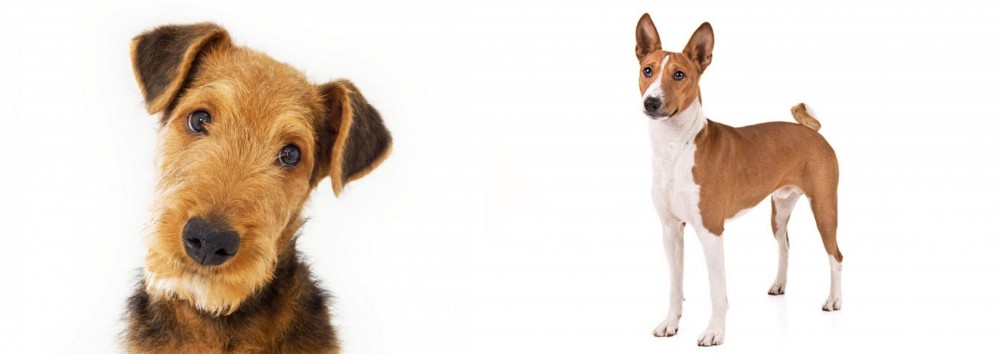 Airedale Terrier is originated from United Kingdom but Basenji is originated from Congo. Airedale Terrier may grow 18 cm / 8 inches higher than Basenji. Airedale Terrier may weigh 16 kg / 36 pounds more than Basenji. Both Airedale Terrier and Basenji has almost same life span. Both Airedale Terrier and Basenji has almost same litter size. Airedale Terrier requires High Maintenance. But Basenji requires Low Maintenance
Airedale Terrier is originated from United Kingdom but Basenji is originated from Congo. Airedale Terrier may grow 18 cm / 8 inches higher than Basenji. Airedale Terrier may weigh 16 kg / 36 pounds more than Basenji. Both Airedale Terrier and Basenji has almost same life span. Both Airedale Terrier and Basenji has almost same litter size. Airedale Terrier requires High Maintenance. But Basenji requires Low Maintenance
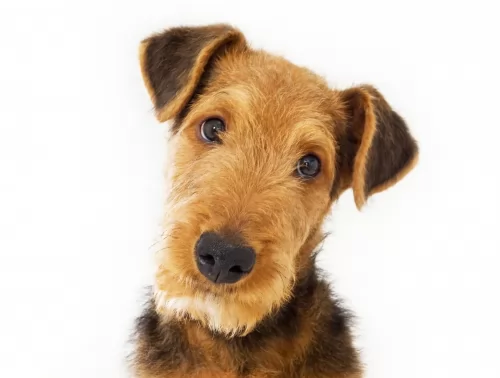 Airedale terrier got its name from a small river Aire in Leeds area in Great Britain. First information about Airedale terrier originates back in 1850. This breed was used as otter hunters. Airedale terrier was invented by mixing Otterhound, old English terrier, and a white bull-terrier. Airedale was used primarily for hunting otters, deer, or wild boars. Not just that, Airedale was a very good guard dog. During the war, this breed was used for delivery and it showed a lot of courage. One Airedale terrier even received a medal for its bravery in World War I. Today it is used as an official dog of National Police of Britain.
Airedale terrier got its name from a small river Aire in Leeds area in Great Britain. First information about Airedale terrier originates back in 1850. This breed was used as otter hunters. Airedale terrier was invented by mixing Otterhound, old English terrier, and a white bull-terrier. Airedale was used primarily for hunting otters, deer, or wild boars. Not just that, Airedale was a very good guard dog. During the war, this breed was used for delivery and it showed a lot of courage. One Airedale terrier even received a medal for its bravery in World War I. Today it is used as an official dog of National Police of Britain.
 The Basenji is an old breeds of domesticated dog and the dog was discovered by Westerners in the Congo region of West Africa in the 19th century. The word ‘Basenji’ means ‘dog of the bush’ the Congo area of Africa. The Basenji falls into the hound category as a hunting dog.
The Basenji is an old breeds of domesticated dog and the dog was discovered by Westerners in the Congo region of West Africa in the 19th century. The word ‘Basenji’ means ‘dog of the bush’ the Congo area of Africa. The Basenji falls into the hound category as a hunting dog.
The dogs were first imported into England and the United States in the 1930s.The Basenji Club of America was started in 1942, and the American Kennel Club recognized the breed in 1943. The new additions also introduced the brindle color pattern to the Western Basenji.
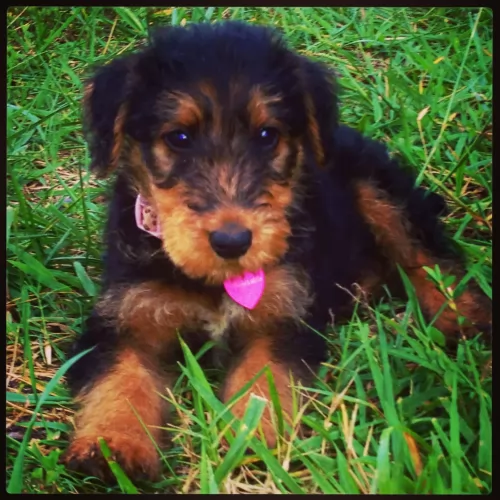 Average height of Airedale terrier is approximately 56-61cm, while their average weight is 20-29kg. Females are slightly smaller than male dogs.
A lifespan of an Airedale terrier variates and depends on the health of the dog but the average lifespan of this breed is 10-12.
Litter Size of the Airedale terrier is approximately 8-9 puppies.
Other Names Waterside Terrier, Bingley Terrier, King of Terriers
Average height of Airedale terrier is approximately 56-61cm, while their average weight is 20-29kg. Females are slightly smaller than male dogs.
A lifespan of an Airedale terrier variates and depends on the health of the dog but the average lifespan of this breed is 10-12.
Litter Size of the Airedale terrier is approximately 8-9 puppies.
Other Names Waterside Terrier, Bingley Terrier, King of Terriers
 Described as being catlike, this is an unusual dog to say the least. The reason for this is that he doesn’t have a bark but rather emits a characteristic noise which is likened to a chortel and a yodel. The Basenji is a medium sized dog but he isn’t robust looking. He is a lightly built dog of 40 – 43cm in height and his coat is short and sleek. He has long legs which help with being quick and agile and his shortish tail curls over his back and he has naturally upright ears.
Described as being catlike, this is an unusual dog to say the least. The reason for this is that he doesn’t have a bark but rather emits a characteristic noise which is likened to a chortel and a yodel. The Basenji is a medium sized dog but he isn’t robust looking. He is a lightly built dog of 40 – 43cm in height and his coat is short and sleek. He has long legs which help with being quick and agile and his shortish tail curls over his back and he has naturally upright ears.
As we’ve said, this is an unusual dog, and his wrinkled head gives the dog a quizzical expression. Another strange feature is that not only is this dog breed looked upon as being somewhat primitive, the odd thing about these dogs is that the female only comes into heat once a year. Another somewhat unusual aspect of this self-confident, friendly dog is that unlike other dogs which have a typical dog odour, this canine is odourless, making him a particularly excellent household pet.
His coat comes in different colors and this can be red and white, tan, tan and white as well as black and white or tri-color. These particular dogs are well known for their excellent eyesight and their excellent sense of smell.
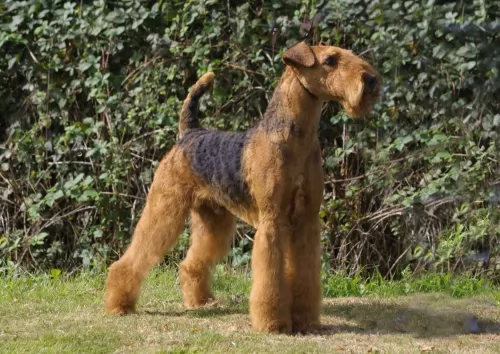 Airedale terrier is an amazing and playful dog. They are very intelligent, hard-working, and athletic dogs. This breed has a lot of energy and stamina, so regular activity is a must for this breed. They are independent thinkers which can be challenging sometimes, but overall, if they have enough activity they are amazing and goofy pets.
Airedale terrier is an amazing and playful dog. They are very intelligent, hard-working, and athletic dogs. This breed has a lot of energy and stamina, so regular activity is a must for this breed. They are independent thinkers which can be challenging sometimes, but overall, if they have enough activity they are amazing and goofy pets.
It is not recommendable to leave your dog for a long period of time because it will get bored, and when it’s bored, they tend to become destructive. You don’t want to see destroyed home when you come back from work.
Airedale terrier is great watchdog too. They will protect family if it is necessary, but overall they are very friendly. They are very sensitive and gentle with kids. Also, with a proper socialization of the dog, they are very friendly towards another animal too.
Basically, the temperament of your Airedale terrier depends on training, socialization, and genes. If you properly train your dog, with good socialization you won’t be having any problems.
 The Basenji is an affectionate dog with his family, but he doesn’t take kindly to strangers. If he is socialized when young, he’ll be fairly friendly with other pets in the family too. The Basenji is an intelligent dog but not particularly easy to train, and will require patience as he has a will of his own.
The Basenji is an affectionate dog with his family, but he doesn’t take kindly to strangers. If he is socialized when young, he’ll be fairly friendly with other pets in the family too. The Basenji is an intelligent dog but not particularly easy to train, and will require patience as he has a will of his own.
These short-haired dogs are clean-living with grooming habits similar to a cat. They shed just a little too. They love their human family and will make a good watchdog because they are courageous dogs, ready to defend what they love.
This is an unusual dog, and not everyone will appreciate him as a pet as he is independent, obstinate and determined to do his own thing. If you’re a single person or a family who spends a lot of time outdoors hiking, swimming and hunting – then the Basenji can make an affectionate devoted, loyal companion.
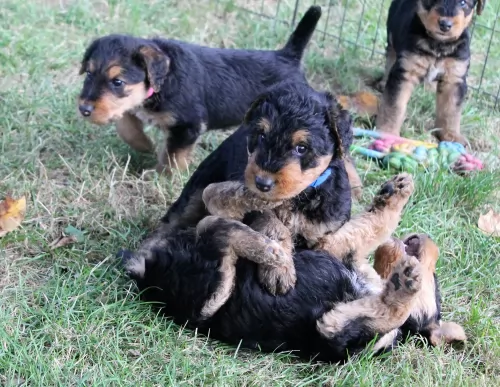 Airedale terrier is generally a very healthy dog, but as almost any breed, they can have some health issues. Hip dysplasia, cancer, and allergies can cause problems with this breed. You have to be very careful when choosing a perfect dog for you. Examine the family tree to avoid the possible genetic flaws.
Airedale terrier is generally a very healthy dog, but as almost any breed, they can have some health issues. Hip dysplasia, cancer, and allergies can cause problems with this breed. You have to be very careful when choosing a perfect dog for you. Examine the family tree to avoid the possible genetic flaws.
Airedale terrier will be a healthy dog if you take a proper care, and with regular vet checks, there shouldn’t be any problems.
 Basenji are generally healthy dogs. As with most other canines, these dogs are also prone to health disorders such as canine hip dysplasia. Check your Basenji for hereditary eye diseases which can lead to blindness.
Basenji are generally healthy dogs. As with most other canines, these dogs are also prone to health disorders such as canine hip dysplasia. Check your Basenji for hereditary eye diseases which can lead to blindness.
This is a kidney disease where your pet will urinate out the protein he so badly needs. He’ll be excessively thirsty and the disease mostly sets in from 4 years of age. It is an inherited kidney disease which can be fatal.
Many health problems can be partially- or totally prevented by the way you raise your puppy, and the lifestyle you provide him with. By doing everything you can to give him good food, a dry, warm space to sleep, lots of activities and exercise and plenty of love and attention, you’ll have less health problems.
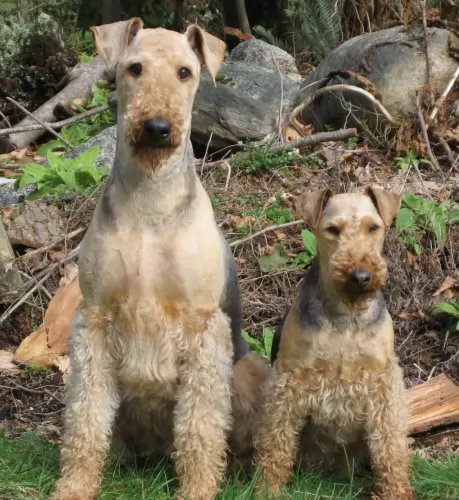 Airedale feeding depends on how much daily activity has. Overall, for an average Airedale 1.5-2.5 cups of high-quality dry food, divided into a 2 meals is recommendable. It is better than leaving the whole food out all the time. Then again, if your dog is not very active or active more than an average dog, feeding should be organized for your dog’s needs.
Airedale feeding depends on how much daily activity has. Overall, for an average Airedale 1.5-2.5 cups of high-quality dry food, divided into a 2 meals is recommendable. It is better than leaving the whole food out all the time. Then again, if your dog is not very active or active more than an average dog, feeding should be organized for your dog’s needs.
Airedale puppies should eat more than an adult dog. 3-5 meals per day are an optimal measure. Puppies need more meals per day for better development. Also, giving your puppy minerals and vitamins would improve overall health when it is fully grown dog.
Airedale has a very interesting coat. The coat has two layers, topcoat which is strong, and undercoat which is soft. They do not shed a lot, but twice a year they shed more than the rest of the time. It is not very hard to groom Airedale terrier. Brushing is recommended once or twice a week. You can also bath your Airedale but not very often. Airedale doesn’t require trimming, but some owners decide to do that. It is up to you if you want to trim your dog.
 Basenjis are fastidious – much like a cat, and they like to be licking at their coats to keep themselves clean. They have a short coat, and this will need to be brushed once or twice a week to get rid of loose hairs and to also stimulated skin oils throughout the coat to keep it shiny and glossy.
Basenjis are fastidious – much like a cat, and they like to be licking at their coats to keep themselves clean. They have a short coat, and this will need to be brushed once or twice a week to get rid of loose hairs and to also stimulated skin oils throughout the coat to keep it shiny and glossy.
As with all dog breeds, the Basenji‘s ears should be checked over and his nails regularly trimmed.
The Basenji needs high quality dog food, regardless of whether you food him commercially manufactured foods or you make your own. If you aren’t sure about how to feed a dog properly to maintain good health, speak to your veterinarian. Dog food needs to be appropriate to the dog’s age and his breed type. Certainly it can be wise to learn what human foods can be dangerous for your dog. Clean, fresh water from bowls which are regularly cleaned should be accessible at all times.